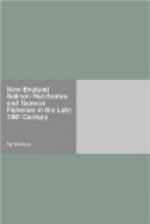The flesh of horses has been used only during the season of 1893. Old and worn out horses and those hopelessly crippled or dying suddenly have been bought when offered, and used in the same way as the butcher’s offal; the parts that could be chopped readily have been fed direct to the fish so far as needed; and other parts have been used in the rearing of maggots. The season’s experience has been so satisfactory that greater use will be made of horse flesh hereafter.
Next to the chopped meat, maggots have constituted the most important article of food, and their systematic production has received much attention. A rough wooden building has been erected for the accommodation of this branch of the work and one man is constantly employed about it during the summer and early autumn months. The maggots thus far employed are exclusively flesh-eaters, mainly those of two undetermined species of flies—the first and most important being a small smooth, shining green or bluish-green fly occurring at the beginning of summer and remaining in somewhat diminished numbers until October, and the other a large rough, steel-blue fly that makes its appearance later and in autumn becomes the predominating species, having such hardiness as to continue the reproduction of its kind long after the occurrence of frosts sufficiently severe to freeze the ground.
In outline the procedure is to expose the flesh of animals in a sheltered location during the day, and when well stocked with the spawn of the flies to place it in boxes which are set away in the “fly house” to develop; when fully grown the maggots are taken out and fed at once to the fish. The materials used for the enticing of the flies and the nourishment of the maggots have been various. Stale meat from the markets has been perhaps the leading article, but we have also used such parts of the butcher’s offal and of the horse carcasses as were not well adapted to chopping; fish, fresh dried or pickled; fish pomace from herring-oil works, and any animal refuse that came to hand.
Fresh or slightly tainted meat has been used to greater extent than any other material, and has proved itself equally good with any. Fresh fish is very attractive to the flies, and when in just the proper condition may be equally good with fresh meat, but some kinds of fish are too oily, for instance, alewives and herring, and all sorts thus far tried are apt to be too watery.
A very limited trial of fish dried without salt or smoke indicates that it is, when free from oil, a very superior article; it has, of course, to be moistened before using. Its preparation presents some difficulties, but in winter it is easily effected by impaling the whole fish on sticks and hanging them up, (after the manner of alewives or herring in a smokehouse) under a roof where they will be protected from rain without hindering the circulation of air; in this way we have dried many flounders and other refuse fish from the smelt fisheries, which are conducted with bag nets in the vicinity of Bucksport.




